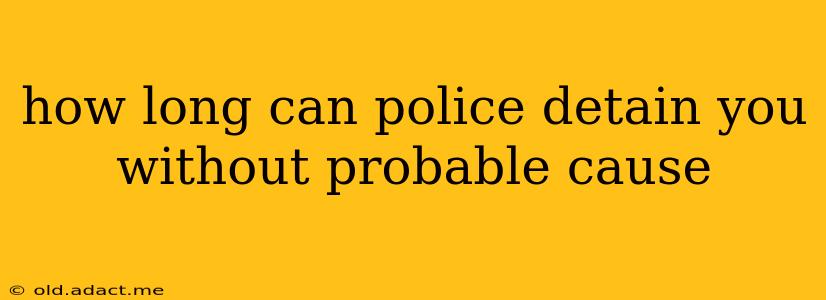How Long Can Police Detain You Without Probable Cause?
The length of time police can detain you without probable cause is a critical question with no single, simple answer. It varies significantly depending on several factors, including your location (state and even specific jurisdiction), the circumstances of the detention, and the specific legal precedents set in your area. Understanding your rights during a police stop is crucial to protecting yourself.
This is not legal advice. If you are detained by police, it is essential to exercise your right to remain silent and consult with a lawyer as soon as possible.
What Constitutes a Detention?
Before we delve into time limits, let's clarify what constitutes a police detention. A detention occurs when a reasonable person wouldn't feel free to leave. This isn't simply a brief interaction; it involves a show of authority that restricts your freedom of movement. This could involve being physically stopped, being questioned for an extended period, or having your identification or belongings checked without your consent.
The Fourth Amendment and Reasonable Suspicion
The Fourth Amendment of the U.S. Constitution protects against unreasonable searches and seizures. Police can briefly detain you for investigation if they have reasonable suspicion that you've been, are, or are about to be involved in criminal activity. This is a lower standard than probable cause, which requires a higher degree of certainty. Reasonable suspicion is based on specific and articulable facts that, when viewed in their totality, suggest criminal activity.
How Long is "Brief"? The Terry Stop
The Supreme Court case Terry v. Ohio (1968) established the legality of brief investigative stops based on reasonable suspicion. These are often referred to as "Terry stops." However, the crucial point is that a Terry stop must be brief. The police can only detain you for the time reasonably necessary to investigate the suspicion. This time frame is highly contextual and depends on the specific circumstances. Excessive length transforms a Terry stop into an illegal detention.
Factors Affecting Detention Length
Several factors influence how long a detention without probable cause can last:
- The nature of the suspicion: A suspicion of a minor offense will likely justify a shorter detention than a suspicion of a serious crime.
- The availability of information: If police need time to obtain further information (e.g., checking a witness statement, running a background check), the detention might be longer, provided it remains reasonably proportionate to the suspicion.
- The cooperation of the individual: If you cooperate fully and provide necessary information quickly, the detention might be shorter. However, you are not obligated to answer questions without a lawyer present.
- Jurisdictional variations: State and local laws can significantly influence the permissible duration of a detention based on reasonable suspicion.
What if Police Exceed the Time Limit?
If you believe the police have detained you unlawfully for too long without probable cause, the evidence gathered during the excessive detention might be suppressed in court. This means the evidence cannot be used against you. This requires legal action and the assistance of an attorney.
H2: What are my rights if I'm detained by the police?
You have several crucial rights during a police detention:
- The right to remain silent: You are not obligated to answer questions. Anything you say can be used against you.
- The right to an attorney: You have the right to have a lawyer present during questioning. If you can't afford an attorney, one will be appointed to you.
- The right to know why you are being detained: Police must inform you of the reason for your detention.
H2: What should I do if I think I've been illegally detained?
If you believe you have been illegally detained, remain calm, and try to remember as many details as possible, including the officers' names and badge numbers, the location, and the time. Document any injuries or mistreatment you experience. Immediately consult with a lawyer to discuss your options.
Remember: The legal landscape surrounding police detentions is complex and nuanced. This information is intended for educational purposes only and does not substitute for legal counsel. Always consult with an attorney if you have questions about your rights during a police interaction.
